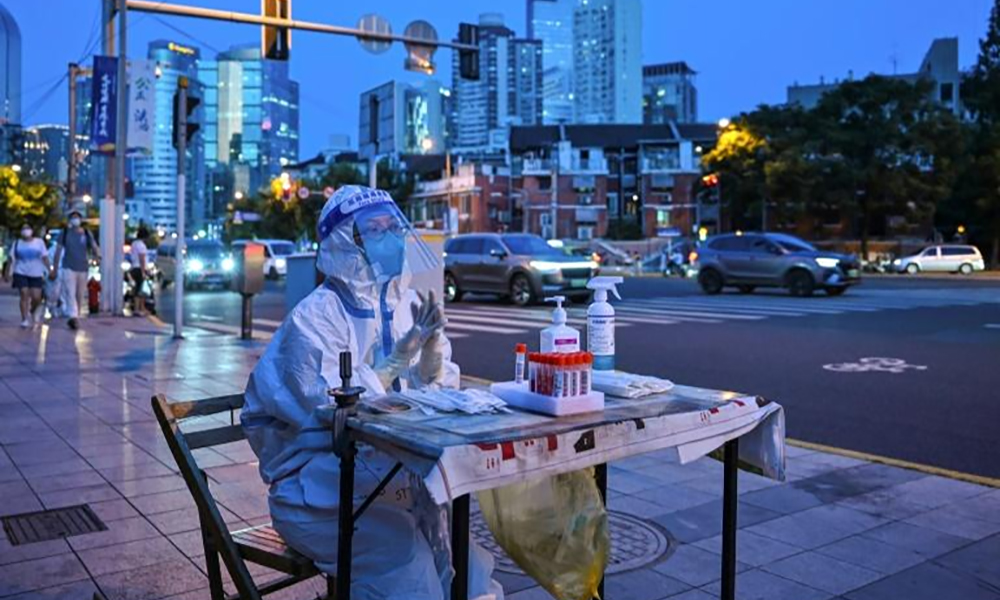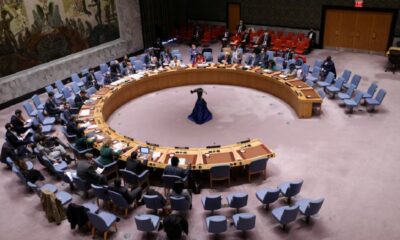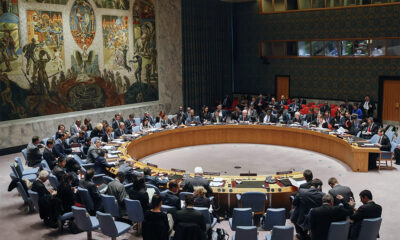COVID-19
Just bread and noodles: China’s Covid-19 lockdown distress hits Xinjiang

Yining, a city in the Xinjiang region of far-western China, celebrated a boom in Chinese tourists this summer seeking a sunny respite from Covid-19 worries in their home towns.
Now Yining is under its own grueling, weeks-long pandemic lockdown, with residents calling for help over limited food, and difficulty getting medicine, New York Times reported.
People in the city of 600,000 have been commanded to stay in their homes since early August, forcing many to rely largely on neighborhood officials to deliver supplies.
One resident contacted by telephone said that he received food every five days but that there was little of nutritional value – no fruit, vegetables or meat. He offered only his given name, Zubayr, fearing reprisals from officials over describing the tough conditions, the New York Times reported.
The conditions in Yining that people described online or in phone interviews echoed those of other cities in China that shut down to enforce the government’s commitment to “dynamic zero-Covid-19”, keeping infections of the coronavirus close to zero.
Some Shanghai residents complained loudly about food and medicine shortages earlier this year after officials there were overwhelmed during a citywide shutdown that lasted two months.
It is in the north-west corner of Xinjiang, an ethnically divided region that has faced a crackdown aimed at Uighurs, Kazakhs and other largely Muslim minorities. Late last month, the United Nations’ human rights office said the Chinese government’s mass detentions and other repressive measures in Xinjiang “may constitute international crimes, in particular, crimes against humanity”.
In recent days, complaints from Yining have generated a surge of online comments in China. Uighurs abroad have also shared messages describing poor conditions in quarantine facilities for residents suspected of having had close contact with infected people in Yining, which Uighurs call Ghulja, the NYT reported.
“I think what has happened in Shanghai gets more attention, as it’s a financial hub, and Chinese people can protest,” Ms Rayhan Asat, a Uighur human rights lawyer who is a fellow at Yale Law School.
“But things have gone so extreme and compelled people to call for attention,” she said of Yining and other locked down parts of Xinjiang. “Many don’t have the tools or the audacity to share what’s happening to them individually.”
In the coming weeks, other cities across China may come under similar pressures.
The Communist Party will hold a major congress in mid-October, when delegates are poised to anoint Mr Xi Jinping to another five years as national leader, and local authorities are under intense pressure to stanch outbreaks of Covid-19 that could sully or disrupt the meeting.
Until late July, officials in Yining appeared jubilant about the return of tourists to the area. In past years, many visitors had been deterred by the intimidating security crackdown and warnings across Xinjiang and then by Covid-19, the New York Times reported.
COVID-19
WHO declares end to COVID global health emergency

The World Health Organization said Friday that COVID-19 no longer qualifies as a global emergency, marking a symbolic end to the devastating coronavirus pandemic that triggered once-unthinkable lockdowns, upended economies and killed millions of people worldwide.
The announcement, made more than three years after WHO declared the coronavirus an international crisis, offers some relief, if not an ending, to a pandemic that stirred fear and suspicion, hand-wringing and finger-pointing across the globe, AP reported.
The U.N. health agency’s officials said that even though the emergency phase was over, the pandemic hasn’t finished, noting recent spikes in cases in Southeast Asia and the Middle East.
WHO says thousands of people are still dying from the virus every week, and millions of others are suffering from debilitating, long-term effects.
“It’s with great hope that I declare COVID-19 over as a global health emergency,” WHO Director-General Tedros Adhanom Ghebreyesus said.
“That does not mean COVID-19 is over as a global health threat,” he said, warning that new variants could yet emerge. Tedros noted that while the official COVID-19 death toll was 7 million, the real figure was estimated to be at least 20 million.
Tedros said the pandemic had been on a downward trend for more than a year, acknowledging that most countries have already returned to life before COVID-19.
He bemoaned the damage that COVID-19 had done to the global community, saying the pandemic had shattered businesses, exacerbated political divisions, led to the spread of misinformation and plunged millions into poverty.
When the U.N. health agency first declared the coronavirus to be an international crisis on Jan. 30, 2020, it hadn’t yet been named COVID-19 and there were no major outbreaks beyond China.
More than three years later, the virus has caused an estimated 764 million cases globally and about 5 billion people have received at least one dose of vaccine.
In the U.S., the public health emergency declaration made regarding COVID-19 is set to expire on May 11, when wide-ranging measures to support the pandemic response, including vaccine mandates, will end. Many other countries, including Germany, France and Britain, dropped most of their provisions against the pandemic last year.
When Tedros declared COVID-19 to be an emergency in 2020, he said his greatest fear was the virus’ potential to spread in countries with weak health systems.
Most recently, WHO has struggled to investigate the origins of the coronavirus, a challenging scientific endeavor that has also become politically fraught.
COVID-19
COVID-19 in Iran: Nearly 900 new cases, 24 deaths recorded

The Iranian health ministry announced on Sunday that more than 890 new cases of COVID-19 have been identified across the country during the past 24 hours, adding that 24 patients have died in the same period of time, Fars News Agency reported.
“A sum of 891 new patients infected with COVID-19 have been identified in the country based on confirmed diagnosis criteria during the past 24 hours,” the Iranian Health Ministry’s Public Relations Center said on Sunday, adding, “454 patients have been hospitalized during the same time span.”
The ministry’s public relations center said 611 people infected with COVID-19 are in critical condition.
COVID-19
China says 200 million treated, pandemic ‘decisively’ beaten

China says more than 200 million of its citizens have been diagnosed and treated for COVID-19 since it lifted strict containment measures beginning in November.
With 800,000 of the most critically ill patients having recovered, China has “decisively beaten” the pandemic, according to notes from a meeting of the ruling Communist Party’s all-powerful Politburo Standing Committee presided over by President and party leader Xi Jinping, AP reported.
China enforced some of the world’s most draconian lockdowns, quarantines and travel restrictions and still faces questions about the origins of the virus that was first detected in the central Chinese city of Wuhan in late 2019. Heavy-handed enforcement prompted rare anti-government protests and took a heavy toll on the world’s second-largest economy.
The official Xinhua News Agency quoted Xi as saying that policies to control the outbreak had been “entirely correct.” The abrupt lifting in November and December of the “zero COVID” policy that had sought to eliminate all cases of the virus led to a surge in infections that temporarily overwhelmed hospitals.
Case numbers have since peaked and life has largely returned to normal, although international travel in and out of China has yet to return to pre-pandemic levels.
China is now transitioning to a post-pandemic stage after a fight against the outbreak that was “extraordinary in the extreme,” Xinhua said.
The government will continue to “optimize and adjust prevention and control policies and measures according to the times and situations with a strong historical responsibility and strong strategic determination,” Xinhua said.
-

 Sport4 days ago
Sport4 days agoACL draw to be broadcast live on ATN channels
-

 Regional4 days ago
Regional4 days agoIRGC chief warns of harsher response if Israel attacks Iran
-

 Regional4 days ago
Regional4 days agoIran launches retaliatory attack on Israel with hundreds of drones, missiles
-

 Sport3 days ago
Sport3 days agoACL fever grows as fixtures finalized
-

 Latest News4 days ago
Latest News4 days agoContact group on Afghanistan hits roadblock over Pakistan’s gripe with India
-

 Sport4 days ago
Sport4 days agoHetmyer powers Rajasthan win in low-scoring IPL thriller
-

 World4 days ago
World4 days agoUN Security Council to meet Sunday on Iran attack
-

 World3 days ago
World3 days agoUS will not take part in any Israeli retaliatory action against Iran

























